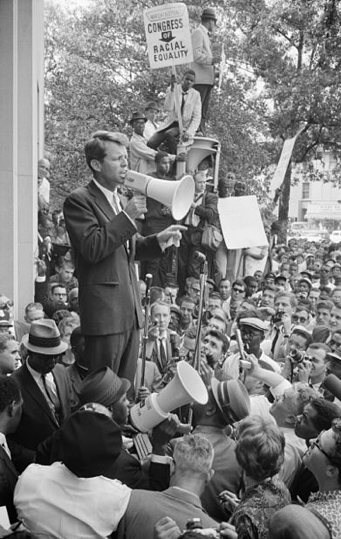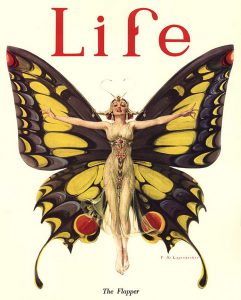On March 16, 1968, Robert F. Kennedy declared that he was running for president of the United States. Robert Kennedy was a humble man, stating that he was not running for president to oppose any man, but to propose new policies. With his brother leaving a big impact on so many, Robert F. Kennedy had big shoes to fill. The start of his pursuit for the presidency of the United States began when he became the 64th US Attorney General on January 21, 1961. On November 22, 1963, Robert lost his older brother, John F. Kennedy, after he was fatally shot in Dallas.1
After his brother had been killed, Robert Kennedy resigned as Attorney General less than a year later, in September of 1964. Wanting to do something different, Robert announced his intent to run for Senate. He successfully became the Senator of New York in 1965 and then began advocating for the poor, for human rights, and against racial discrimination. But he wondered to himself whether he should run for president or not.2 However, he wasn’t motivated to pursue the presidency because of many factors, one of them being his brother’s assassination.
Robert Kennedy was a prominent member of the Democratic Party. Kennedy had liberal views for what he thought would be better for the people of the United States. He thought that everyone should be treated equally and be treated like human beings. He wanted to desegregate schools, and wanted all people to enjoy the same rights. After waiting anxiously and not knowing whether he would run for the Democratic Party’s presidential campaign or not, he finally decided he would run for president, and his presidential campaign began in March 1968. He was prepared to take a risk in order to accomplish what he wanted and what he believed in.3 Something inside of him wanted to make a difference and change America for the better. He was actually a late entry in the primary race for the Democratic Party’s presidential nomination.
Kennedy focused on the issues of social improvement, economic justice, and racial equality. The Democratic Party supported Robert F. Kennedy and they helped him launch his presidential campaign. On March 16, 1968, Robert Kennedy’s presidential campaign began, even before Lyndon B. Johnson announced he wouldn’t run for re-election. He was willing to challenge Johnson for the nomination, which was clearly a risk.

Robert Kennedy gave his first campaign speech at Kansas State University, where he drew a record crowd. In his speech, he spoke out about ending the Vietnam war, then he continued on to the matter of poverty, emphasizing the horror he felt when he saw what poor Americans had to face every day. Towards the end of his speech, he quoted George Bernard Shaw: “Some people see things as they are and say, why? I dream things that never were and say, why not.”4 This quote would become the centerpiece of Kennedy’s presidential campaign and help express the mindset he had about what he wanted to do if he became president. He wanted to create things and change things.
Youth engagement was critical for his campaign. He tried to inspire young leaders, and he created a national resource center for juvenile justice, by giving opportunity to juveniles to do more with their lives. His political platform was structured around racial equality and economic justice. He supported non-aggression in foreign policy, and social improvement for the poor and for people who were segregated.5 Robert F. Kennedy wanted to desegregate schools and wanted every American to have the same rights as every other American. He even spoke to civil rights activist Cesar Chavez, who was just ending a 25-day hunger strike over the treatment that farm workers were enduring.
On March 31, Lyndon B. Johnson stunned the nation by dropping out of the presidential race. At that time there were only fourteen states that held primary elections: California, Florida, Illinois, Indiana, Massachusetts, Nebraska, New Hampshire, New Jersey, Ohio, Oregon, Pennsylvania, South Dakota, Wisconsin and West Virginia. Robert Kennedy had won two primary states: Indiana and Nebraska. When Martin Luther King Jr was shot, on April 4, 1968, Kennedy gave an improvised speech in Indianapolis, Indiana, speaking at two universities. He then boarded a plane to attend campaign rallies, honoring the death Martin Luther King Jr emphasizing his love for life and justice for the people. Robert Kennedy began addressing the people, asking them whether the nation would choose to continue to be segregated and fall apart, or whether it would move together as a country to achieve more. King’s death was an important moment that made many people see that a change was needed.6 Kennedy was behind Hubert Humphrey, Johnson’s Vice President, who had entered the race after LBJ declined to run. At the time, Humphrey was seemed to have an advantage over Kennedy in delegate support, but a victory in California’s primary could turn the tide in Kennedy’s favor.

Things were beginning to look good for Robert F. Kennedy. Then, suddenly, things took a stunning turn for the worst.
On June 5, 1968, presidential candidate Robert F. Kennedy was at the Ambassador Hotel in Los Angeles. It was the evening of the California primary, and the results were just coming in that Kennedy had won both South Dakota and California. He gave a triumphant victory speech, speaking to journalists and campaign workers and supporters. The speech was carried live on television. His victories in the California and South Dakota primary elections gave Kennedy the boost he needed to go into the Democratic Party Convention that summer with confidence that he would win the Democratic nomination for President of the United States. After leaving the podium and exiting through a crowded kitchen hallway, he began to have a conversation with a busboy named Juan Romero. Juan Romero was very grateful that a simple busboy like himself was able to interact with the potential president of the United States. But in the blink of an eye, while shaking the hand of Juan, Robert Kennedy came face to face with a 24-year-old Palestinian immigrant named Sirhan Sirhan. Sirhan suddenly shot Kennedy multiple times with a .22 caliber revolver. Kennedy’s body immediately dropped to the floor and everyone was in shock. Kennedy was later transferred to the Good Samaritan Hospital, where he was pronounced dead the following day.7
After Kennedy’s death, Juan Romero said, “This made me realize that no matter how much hope you have, it can be taken away in a second.”8 Kennedy’s remains were then flown back to St. Patrick’s Cathedral in New York for public viewing before a funeral mass. Thousands of mourners attended in order to see Robert Kennedy’s lifeless body. His blood-stained shirt, tie, and jacket are now in the possession of the Los Angeles County District attorney. Kennedy was then buried near his older brother John Kennedy, in Arlington National Cemetery.
It was later revealed during a search of Sirhan’s home that he held strong anti-Zionist beliefs and, in a diary, he wrote that he was determined to kill Robert Kennedy before June 5, 1968, because that was the first anniversary of the start of the Six-Day War between Israel and its Arab neighbors, and he resented Kennedy and his beliefs. He just held an overpowering hatred for Kennedy. He expressed that hatred toward Kennedy when he found out that Kennedy supported Israel and his attempt to send fifty bombers to Israel to harm the Palestinians. Sirhan was sentenced to death, but it was later commuted to life in prison.9

Later on, as the 1968 election progressed, Richard Nixon won the presidential election. Many believe Kennedy would have ultimately secured his nomination after successfully winning the California primary, were it not for his tragic death; and that he would have gone on to be elected president.10
After Kennedy’s death, things turned into chaos for the Democrats. The Democratic National Convention was held in Chicago in August. The purpose was to select a new presidential nominee to run as the Democratic party’s candidate for office. The Democratic Party ended up choosing Humphrey to run. But the way he was chosen was anything but civil. Party members and the Left were left devastated and demoralized in the wake of Kennedy’s death. Chicago was chaotic, both inside the convention hall and outside on the streets. One can only wonder how it all would have gone, had Kennedy lived.
- Robert F. Kennedy (John F. Kennedy Presidential Library and Museum), May 20, 2017. Accessed August 30, 2018. ↵
- Thurston Clarke, The Last Campaign : Robert F. Kennedy and 82 Days That Inspired America (New York : Henry Holt, 2009, 37-46. ↵
- Diane Nixon, “The Case of the Robert F. Kennedy Assassination Investigation Files,” The Public Historian (2008): 11, 29-35. ↵
- Ray E. Boomhower, Robert F. Kennedy and the 1968 Indiana Primary (Bloomington, Indiana University Press, 2008), 35-41. ↵
- Nora Rawlison and Robert F. Nardini, “Robert Kennedy,” Library Journal 113 (13) (1988): 156-162. ↵
- Micheal Rosenwald, “Robert F. Kennedy’s Remarks on the Assassination of Martin Luther King Jr,” The Journal of Blacks in Higher Education 55 (2007): 5. ↵
- Mel Alyom, Sirhan Sirhan and the Assassination of Robert F. Kennedy (Washington D.C.: 1st Ed Potomac Books, 2007), 60-67. ↵
- John Rogers and Russell Contreras, “Busboy Comforted a Dying Robert Kennedy,” Globe & Mail (Toronto, Canada 2018). ↵
- Ilene Cooper, The Assassination of Robert F. Kennedy (American Library Association / Booklist Publications), 44-50. ↵
- Kenneth Walsh, Shattering the Hope (U.S. News. June 1, 2017) Accessed September 9, 2018. ↵



67 comments
Danielle Slaughter
I definitely think this article was award-worthy. Having been a big fan of John F. Kennedy all my life, it always pains me to hear that his brother soon followed him in manner death. I cannot imagine someone so sick and foolhardy as to assassinate such a wonderful man, and for his sentence to be commuted? It gives me some solace that the Kennedy legacy is still honored in both the political and public world.
Matthew Swaykus
Robert Kennedy sounds like I very passionate individual. Whether or not his promised political policies and plans had much, he held a firm stance on equality and opportunity for all. It was smart for the author to start the article with the after math of his brother’s death. It shows that the significance of the assassination was not lost on Robert and how he was conflicted in running for the presidency. Overall, Luis did an excellent job narrating the struggles, victories, and fallout of his campaign however disappointing it turned out.
Thomas Fraire
I truly delighted in this article. I profoundly trust that if RFK had not been killed, he may have been an extraordinary president (in the event that he had been the victor once winning the Democratic’s essential). It is dismal to perceive how his confidence was as unfeeling as his sibling’s JFK. It would have been pleasant to had seen a greater amount of him on the history books, however for the present everything we can do is discussion about their family’s inheritance as Kennedys.
Mia Morales
The Kennedy family is always an intriguing topic to discuss because of the tragedies they have faced as a family. This article does a really great job of capturing the emotion that thousands of people felt when Robert Kennedy passed and the interesting details about his life that many people may not be aware of. Although he had a short life, he definitely left a legacy.
Alicia Guzman
The horrible fate of the Kennedy children truly has been a tragedy that no family should face. It feels as if the Kennedy curse is truly real. Poor Jackie ultimately lost all of the men important in her life, from her husband, Bobby, and her son. It is so sad that a revolutionary like his older brother, Jack, died especially during times that truly need their help and new perspectives. It makes you wonder if they would have lived where would the country be today?
Fatima Navarro
I really enjoyed this article. I deeply believe that if RFK had not been assassinated, he might have been a great president (if he had been the winner once winning the Democratic’s primary). It is sad to see how his faith was as cruel as his brother’s JFK. It would have been nice to had seen more of him on the history books, but for now all we can do is talk about their family’s legacy as Kennedys.
Samantha Luckey
Congratulations on being nominated for your article! This article was extremely emotionally moving and educational over the hidden aspects of the less known brother. Overall the writing was well done, and this author was able to engage the reader to continue reading on, as well as, informing the reader of important details over the fascinating life of Robert F. Kennedy. Great work!
Alexandra Lopez
Congratulations on your nomination. I have always been fascinated by the Kennedy family. The Kennedy family are well-known in the United States because they still have family members in politics. Unfortunately, Robert Kennedy had the same fate of his brother, John F. Kennedy. Overall, the author did an excellent job informing and researching the topic. Great read! (reposted)
Samire Adam
I am intrigued by this article because it mentions three prominent figures of the Civil Rights movement that were trying to spread equality among citizens. RFK, JFK, and MLK were also all met with the same fate — assassinations by individuals that were angered by their viewpoints. This comes off as especially interesting considering that these leaders were also the most willing to see the other sides to their beliefs and have conversations about their own.
Alexandra Lopez
Congratulations on your nomination. I have always been fascinated by the Kennedy family. The Kennedy family are well-known in the United States because they still have family members in politics. Unfortunately, Robert Kennedy had the same fate of his brother, John F. Kennedy. Overall, the author did an excellent job informing and researching the topic. Great read!